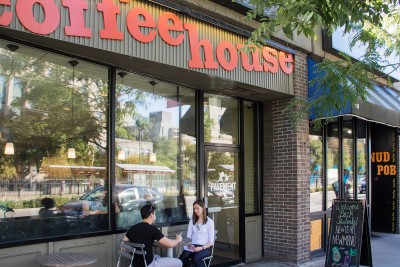
What if we began to swipe right on personality, instead of on pictures?
While applications like Tinder and Bumble dominate the digital social scene, 19-year-old entrepreneur Ocean Pleasant said she believes creating long-lasting connections should be about more than just passion surrounding physical appearance. At a place as large as Boston University, however, it is easy to resort to superficial means. And while it may be intimidating and overwhelming to go up to someone on Commonwealth Avenue and strike up a conversation, Pleasant said she doesn’t believe it is impossible. Thus, she created an app called Real.
“Real is a simple way to meet new friends without sexual pretense or gender bias,” Pleasant said. She said the app’s innovation in a sphere of mainstream socializing applications comes with a different approach and target audience.
In 2015, Pleasant was given a $100,000 grant to develop and create the app, under the Thiel Fellowship program. The grant has helped her network with other young entrepreneurs, Pleasant said. In the past eight months, she was able to make Real a reality based off one of her younger projects, Real Teen Mag. The Real brand has its roots in raising awareness for social causes.
Unlike dating apps, Real is designed to make and establish strong friendships rather than romantic relationships or one-night stands. It was created with the intention of uniting people for social change.
“You’re swiping on personality instead of appearance,” Pleasant said.
Based on user interests, people can unite under community causes such as recycling initiatives or lobbying for a new park.
“Real is a way to make new friends and also have the opportunity to make an impact,” Pleasant said. “[Real] partners with organizations in any city we launch in and provide[s] access to people who would be interested in volunteer opportunities, internships or cool things going on in the area.”
Pleasant said her passion for social awareness began during her childhood.
“I was raised by a single mom who was also a conflict journalist until I was about 13,” Pleasant said. “I was raised in roughly eight different countries … I lived in a slum outside New Delhi … and volunteered.”
With Real, Pleasant incorporated her passion for social good and united her experiences into one app.
“There is so much activism and there are so many things going on, especially around feminist issues, in major cities — like Boston, like New York,” said Susanne Sreedhar, a BU philosophy professor. “Having an app like this that puts people in touch with each other will give them someone to go to with to these activist events. It will help people get together for issues, and it seems like a good thing for activism in general.”
As a student, Pleasant said she recognized the necessity of integrating volunteering with natural socializing.
“I think it’s a good idea,” said Erin Myers, a sophomore in the College of Arts and Sciences. “If I were starting to use it, I would start with other friends … without doing it by myself, to experience it.”
Real has officially launched in New York City, and according to Pleasant, it plans to launch in Boston next. The founder chose Boston as a great place to expand the app because of the number of diverse, young people in the area, Pleasant said. In the meantime, students are invited to download the application to get comfortable with the interface.
“[Real] has six main filter topics we use to filter the most compatible personality,” Pleasant said. “With the amount of students, there are an abundance of interests BU students have … [Real] opens up the opportunities and possibilities to connect with people you wouldn’t normally stop in the street and talk to after class.”
Pleasant is not alone in her beliefs.
“Boston University would have some sort of population definitely interested in using [Real],” said Jenna Quinn, a sophomore in the Sargent College of Health and Rehabilitation Sciences.
Even while students may be interested in Real, marketing the app to BU’s population is what will make the Boston launch more successful.
“I like it when [companies] hand out stuff [at the George Sherman Union] … like a 4-by-6 flyer with all the product information on it,” Quinn said.
Myers suggests Real markets with promotions such as Starbucks gift cards for coffee shop meetups. Both Myers and Quinn said they think the best way to attract students is to avoid bombarding them with too much information and instead focus on giving them an incentive to download the app.
The two also believe that the more popular and normalized the app is, the more likely it is other students will catch on.
“The fact that the creator of Real is 19 years old makes me more intrigued to download the app,” Myers said. “[Pleasant] understands where we’re coming from and thinks this is a good idea, so maybe it is.”



























































































































